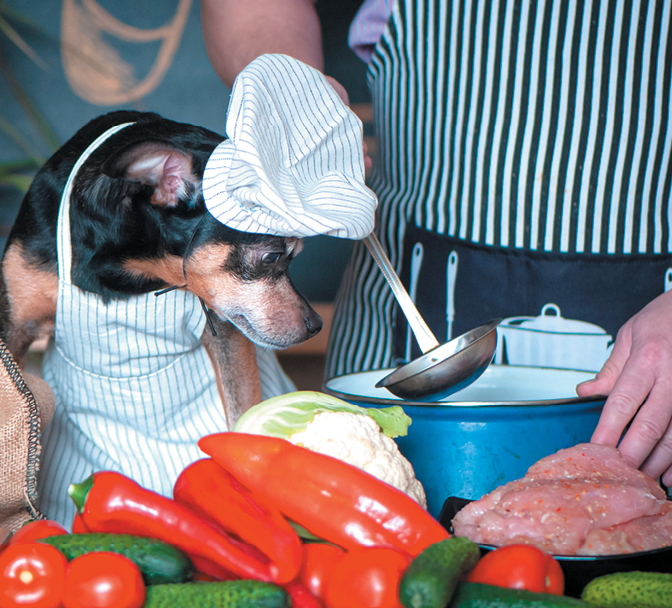You might think dog food gets most of its calories from meat. You can’t tell how much meat is present by looking at dry kibble, but canned dog food certainly looks meaty. And on a canned dog food ingredients list, meat is often listed first, which means it weighs more than the other ingredients.
But the weight of a dog food does not tell what it contributes in calories. Consider that while meat is the major contributor of protein in a dog’s diet by weight, protein makes up only 20 to 28 percent of the calories in food for a healthy dog.
This becomes much more apparent for people who work with a board-certified veterinary nutritionist to prepare home cooked meals for their dogs. Assembling the ingredients themselves, they see that they might be measuring out twice as much in the way of high-carbohydrate foods as high-protein meats. It’s not that there’s so much more carbohydrate than protein in terms of calories. But it takes more carbohydrate than meat to deliver a given number of calories.
It’s confusing for people, says veterinary nutritionist Cailin Heinze, VMD. When they start putting together their dog’s meals with the recipes the veterinary nutritionist gave them, they think something must be wrong because the food doesn’t look
very meaty.
Sometimes, she says, people start adjusting ingredients on their own. They shouldn’t. A veterinarian can walk a skeptical client through the reasons that the food contains less meat than they thought it might.
Meat is not the only source of confusion with homecooked dog food
Some people choose to prepare their own dog food because they are suspicious of ingredients in commercially prepared pet diets. So they are surprised to learn that veterinary nutritionists will often include supplements of various vitamins or minerals in the recipe to insure that the dog gets the right amount and balance of nutrients. They thought it was going be “all natural.”
They sometimes stop adding the supplements — to the detriment of the dog’s health. It would be like removing the nutrients that have been added to the cereal that you eat every morning for breakfast — and to many of the other foods you consume — and then expecting to remain in tip-top shape. You wouldn’t.
“Out pets deserve to be fed a nutritionally balanced diet,” Dr. Heinze says. To learn more about misconceptions surrounding homecooked dog diets, check out her blog in Tufts’ petfoodology website at vetnutrition.tufts.edu. Just type the following into the search bar: “What Nutritionists Wish You Knew: 5 Homecooked Diet Mistakes & Misconceptions.”
If you’re going to feed your dog a diet you prepare in your own kitchen, it’s best to work with a board-certified veterinary nutritionist to insure your pet gets the proper amounts of all essential nutrients.





